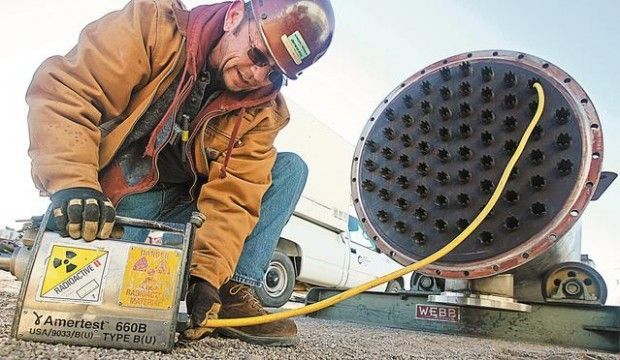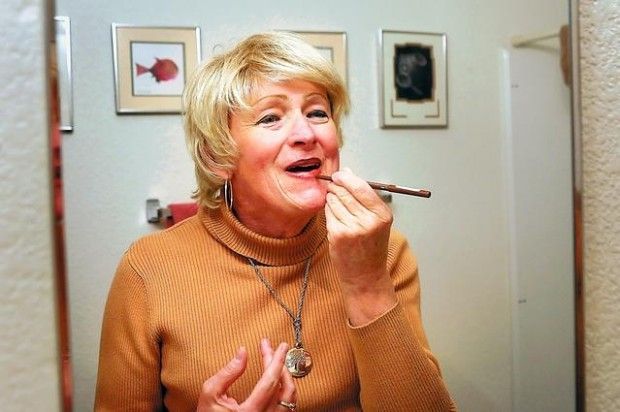In a city that prides itself on respect for military veterans, scorn is a fact of life for former Army captain Erin Russ.
Neighbors gawk when she takes out the trash. At local malls, teenagers titter and hiss as the strapping ex-infantry officer shops for cashmere and heels.
Even simple errands can be a source of angst for Russ, who was born a man but now lives as a woman.
Decades after former soldier Christine Jorgensen stunned 1950s America by undergoing a sex change, a small army of veterans in similar straits has quietly sprung up in Tucson and around the country.
Officially, the Pentagon bans transsexuals — those who believe they were born with the wrong male or female parts — from serving.
Yet some research suggests there may be a higher prevalence in the military than in society at large. That's because some young men, conflicted over their feminine feelings, enlist to try to escape them, the research found.
Advocates refer to these former troops as "invisible" veterans.
"This is something I think nobody wants to talk about," said Russ, 52. "Transgender veterans basically make other people rethink their preconceived ideas of what a veteran is. We don't just push the envelope — we crumple it up and throw it away."
Mocked by strangers and often shortchanged by the veterans health-care system, these ex-troops say they get little of the respect accorded to those they served alongside.
"Serious medical condition"
No one knows for sure how many veterans are affected by "gender identity disorder," which the American Medical Association calls "a serious medical condition . . . which causes intense emotional pain and suffering."
Because prejudice against them is so prevalent, many transgender veterans choose to live in "stealth" mode — quietly trying to blend into society.
The Southern Arizona VA Health Care System sees close to 50 former troops who are transsexual or are diagnosed with gender disorder, many of them in various states of transition from their birth sex. And there may be dozens more who aren't registered for care with the VA, local advocates say.
A national group, the Transgender American Veterans Association, estimates that somewhere around 300,000 transgender people have served, or now serve, in the U.S. military. That's roughly 1 percent of the country's nearly 27 million veterans and 2.2 million active-duty and reserve troops.
Transgender people aren't eligible to serve because they fall under a policy that excludes those with "learning, psychiatric and behavioral disorders," said Douglas Smith, a spokesman for U.S. Army recruiting command.
Yet one of the few studies ever published on the topic said the U.S. military probably has more of them in its ranks than the percentage in the general population.
A study titled "Transsexuals in the Military: Flight Into Hypermasculinity" — a classic still cited in college texts on gender issues — was written in 1988 by Dr. George R. Brown, then an Air Force captain and psychiatrist at Wright-Patterson Air Force Base in Ohio.
Brown found it curious that in a three-year period at the Midwestern base, he came across 11 men — eight current and former military, the rest civilians such as Defense Department staffers — all seeking treatment to become women.
Transsexuality is an issue "believed by many not to exist" in the armed forces, he noted. Yet each veteran told him nearly the same thing: He had enlisted hoping to "become a real man."
Brown also noted that late adolescence — the stage when cross-gender feelings can become so confusing that some feel an urgent need to escape them — coincides with the prime recruiting age for the predominantly male U.S. military.
Because of that, he said, the "prevalence of transsexualism in the armed forces may actually be much higher than in the civilian population."
Brown's findings ring true for Dr. Jennifer Vanderleest, an assistant professor at the University of Arizona College of Medicine — one of the few in the country where future doctors are trained on the medical needs of transgender patients.
Vanderleest conducts that training. She has treated more than 100 transgender people in Tucson, including many veterans who "are very proud of their military service," she said.
Many wait decades before seeking medical help, she said. Avoidance is common because confronting the truth can be wrenching in a culture that often is hostile.
"How can you process what is going on with you internally when you are operating in a world where you can't be who you are?" she asked, describing their dilemma.
In America and many other countries, military careers are killed by such admissions.
Don't ask, don't tell — the U.S. policy on gay and lesbian personnel — doesn't cover transgender troops, who typically are forced out if discovered. A few Western militaries, though — including Canada and the United Kingdom — welcome their service and even pay for their sex-change surgeries.
"Something was different"
Transgender people often sense their predicaments at a young age, Vanderleest said.
That's how it was for Russ, the former Army captain who has been living full time as a female since 2001. Even as a preschooler, she said, "I knew something was different about me."
Joining the military was one action in a long list of things — playing football, becoming an Eagle Scout, getting married and becoming a father — that Russ hoped would still the inner sense of being born with the wrong anatomy.
"You think if you do enough things of a male nature, then you will become male, and the female thoughts will go away."
Growing up in Syracuse, N.Y., in a 1950s neighborhood chock- full of other boys, Russ chose to play with girls and was deemed "a sissy."
In junior high, Russ started cross-dressing in secret, a practice that would continue for years as the young man wrestled with the turmoil between who he believed he was and who he pretended to be.
Commissioned as an Army officer in 1979, Russ served a total of 11 years in the reserves and on active duty, and planned to stay on until retirement. But in 1990, Russ said, "my career came to a screeching halt."
While stationed at Fort Wainwright in Alaska, the captain, off-duty and dressed as a woman, was stopped by civilian police for a driving violation. The traffic cop "wrote a page-long report on how I was dressed and gave a copy to the military," Russ said.
"On Monday morning, I was called into the commander's office and told I was going to be court-martialed for conduct unbecoming an officer."
Russ was allowed to resign honorably and, after a painful divorce, came to Tucson a few years later. "At that point, I was thinking, 'I can't go on like this.' "
So she grew her hair long and started going to the veterans hospital for hormone treatments, which softened her skin and swelled her breasts.
She turned to the Bible for comfort — she leads a monthly Bible study for transgender people — and got therapy to help her cope.
Then, ignoring the neighbors' stares, the 6-foot-2 former soldier walked out her front door and started living a new life.
"People usually don't change until the pain of staying the same exceeds the pain of changing," Russ said. "For me, the pain of staying the same was overwhelming."
Risk of suicide
For some, suicide starts to seem like the best solution.
Diane Steen, an Air Force veteran who served as a man and now is a woman, often thought of killing herself.
"I was suicidal for most of my adult life. It's a very lonely journey to live a lie," said Steen, a youthful 64-year-old who has been volunteering at Tucson's veterans hospital since 2004.
Like Russ, Steen sensed early that something was amiss, but he had no words to describe it growing up in 1940s Indiana.
By age 6, Steen, then a little boy named Robert, was cross-dressing in outfits borrowed from cousins. Before long, he was sneaking his mother's lipstick.
In 1952, when Steen was in third grade, a bombshell hit America: Newspapers revealed that a male military veteran had gone to Europe for a sex-change operation and had come back as a woman — Christine Jorgensen.
The tale intrigued Steen.
"I heard the surgery cost $2,000 and I remember thinking to myself: 'If I had $2,000, I would do that.' Now why would a kid even think something like that?"
Decades passed before Steen allowed the thought to surface again. Through marriage, fatherhood and four years in the military, "I buried my transsexual self very deep," she said.
Today, Jorgensen's biography shares shelf space in Steen's library with books on Civil War history. Her bedroom has mauve walls, a cream-colored velvet bedspread and a closet brimming with size 12 women's wear.
Five years after her own sex- change surgery, "I am at peace," Steen said.
Assaulted over gender
For former soldier Janey Kay, peace has been more elusive.
The two-tour Vietnam veteran moved to Tucson from Missouri in 2006 and hoped life would get easier after she decided to become a woman.
Last October outside Tucson Greyhound Park — eight months after undergoing sex-change surgery in Thailand — Kay was assaulted by a man who kicked and punched her, calling her a "drag queen" and a "faggot," a police report said.
He also tore out two handfuls of Kay's hair in the attack.
The suspect, a 48-year-old Tucson man, was charged on suspicion of assault. No trial date has been set.
Besides Kay's diagnosis of gender-identity disorder, she suffers from chronic post-traumatic stress disorder and other problems that leave her vulnerable to mood swings. She also battles depression so severe that she's been treated in the past with electroshock therapy, her medical records show.
Kay, 59, said her mental problems were aggravated by decades of living in the wrong body.
"I remember as young as 8 or 9 years old looking in the mirror and seeing a girl. I just repressed it and repressed it until, finally, I cracked."
She enlisted in the military, she said, because she was terrified of the truth. "Joining the Army was an escape. I thought I could get away from it, but I could never escape."
20 years in uniform
Mick Andoso of Tucson, now a bearded construction inspector, kept his secret for 20 years as a woman in the Air Force.
Andoso, 51, retired in 1995 as a first sergeant. Back then, Andoso's name was Master Sgt. Brenda Weichelt — who in 1994 was named one of the service's top airmen for her work at the military's Defense Language Institute in California.
Andoso still has a copy of an Air Force Sergeants Association magazine describing the award, and photos taken with the service's top brass. Also among the keepsakes is a letter from Brenda's last commander.
"You are among the few rare exceptions whose absolute dedication to duty, commitment to excellence and genuine concern for your service and your fellow airmen, set you so far apart that I can never forget your outstanding achievements," it said.
Andoso joined the service to obtain job skills and escape from a family that didn't understand why Brenda, as a youngster, had always insisted she was a boy.
Once in uniform, "I had to resign myself that I couldn't (become a male) because I loved the Air Force, and I would've had to give that up."
Andoso still looks back fondly on his military days. But he's disappointed by how the Air Force has treated him since he retired and switched genders.
A few years ago, after legally changing his name and gender, he said he went to Davis-Monthan Air Force Base to ask for a new photo ID card to access base services for retirees. He showed a clerk a copy of his court order.
The D-M staffer said the Air Force doesn't allow gender changes, Andoso recalled. "He was really rude. I got the impression he was disgusted by me."
A D-M spokeswomen, 1st Lt. Mary Pekas, said Defense Department policy forbids gender changes in its records system. Department lawyers "reviewed that policy on several occasions and found it to be legally supportable," Pekas said.
Andoso's run-in is not surprising, said Monica Helms, a Vietnam-era Navy submariner and president of the Transgender American Veterans Association, a national group formed in 2003 to combat stigma against such veterans.
Transgender veterans often are disrespected at military bases, in the VA system and elsewhere in a society that professes to honor those who have served their nation, she said.
"Transgender people have fought in every war, shedding the same red American blood as every other person who has protected this nation," Helms said.
"We have done our part to preserve the freedom of everyone in this country," she said, "and we are proud to have served."On StarNet: Find a copy of the study "Transsexuals in the Military: Flight Into Hypermasculinity" at www.azstarnet.com/pdf
The project
• Today: Tucson's invisible veterans: Former troops who change sexes face stigma, scorn.
• Monday: Transgender veterans find VA medical care inconsistent.






